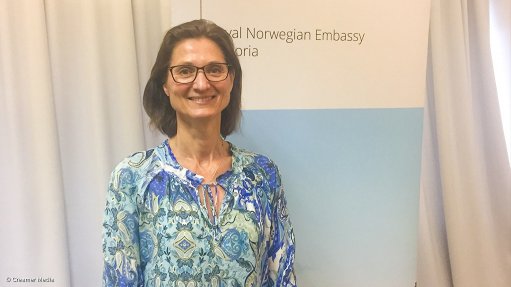
Norway's Deputy Foreign Affairs Minister, Marianne Hagen
The Norwegian government is optimistic that the new South African government, led by President Cyril Ramaphosa, will promote a more stable and predictable business environment that is conducive to higher levels of trade and investment between the two countries.
Deputy Foreign Affairs Minister Marianne Hagen, who is in South Africa this week for a series of meetings as part of yearly bilateral consultations, said Norway was encouraged by the priority being given by Ramaphosa’s government to improving prospects for economic growth and investment, as well as to restoring policy certainty.
“It’s very positive that his government is committed to creating a more predictable business environment and advancing a pro-growth agenda,” Hagen said during a business seminar in Pretoria.
She singled out the South African government’s recent commitment to sign agreements for 27 renewable-energy independent power producer (IPP) projects, delayed since 2016, as a “good example” of the efforts being made to restore predictability and policy certainty.
While the project agreements were not signed as planned on March 13 – owing to a last minute attempt by the National Union of Metal Workers of South Africa and Transform RSA to have them interdicted – Energy Minister Jeff Radebe had indicated that they would be signed “immediately” after the matter had been heard in court on March 27.
“Even though these agreements are currently being challenged in court, I am convinced that renewable energy has a great future in South Africa,” Hagen said, while nevertheless underlining the need for government to stick to its renewables timelines.
Oslo-listed renewable-energy firm Scatec Solar has three solar photovoltaic projects, with a combined capacity of 258 MW, as part of the group of 27 IPP projects that are yet to be signed. GM Jan Fourie expressed optimism that the legal challenge would be cleared and that the projects would reach financial close during April.
Hagen stressed that policy certainty would also be critical for any further investments by Norwegian oil and gas group Statoil, which has four exploration licences on the South African continental shelf. “This could lead to major investments in the future, if the conditions are right.”
Norway was sympathetic to the need for accelerated land reform in South Africa, where lawmakers recently voted to review Clause 25 of the Constitution, relating to the payment of just and equitable compensation for expropriated land.
“But it’s also important that the South African government notices the uncertainty this creates in the international business community, because it just comes back to predictability, transparency and a business-friendly framework.”
A strong proponent of international trade liberalisation, Norway was also keen for the level of trade between South Africa and Norway to rise. In 2017, bilateral trade between South Africa and Norway stood at nearly R5-billion, with a trade balance in South Africa’s favour.
Norway’s exports to South Africa came in at R1.2-billion last year, with the main categories being seafood (42%), machinery (14%), scientific instruments (12%) and chemical products (6%). South Africa exported about R3.6-billion of goods to Norway, with the main categories being minerals (41%), motor vehicles (22%), vegetables (17%) and other metals (11%).
“There are still those who see trade as a zero-sum gain, with exports viewed as good and imports as bad – we are not among them,” Hagen stressed. “Norway has become a prosperous country not despite being an open economy, but because we are an open economy – open to trade and investments.”